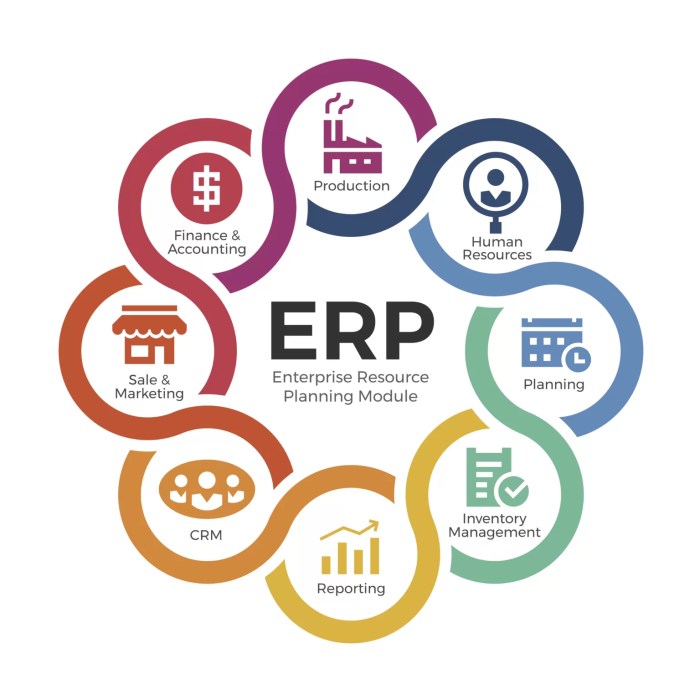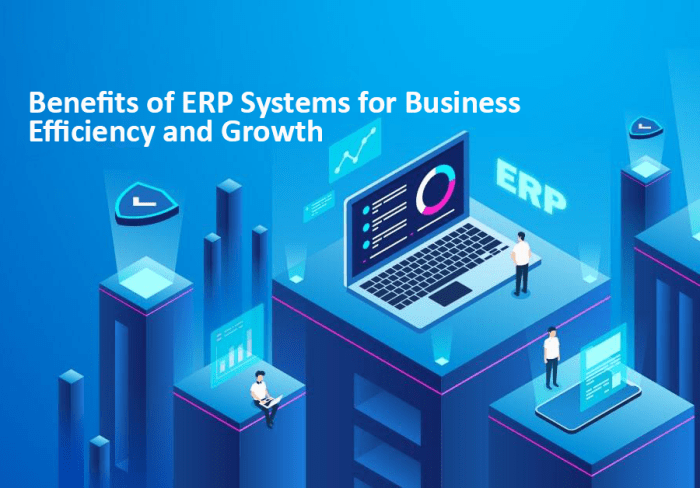How ERP systems can help businesses manage their workforce more effectively is a question that many organizations are asking. In today’s dynamic business landscape, where efficiency and agility are paramount, organizations are constantly seeking innovative solutions to streamline their workforce management processes. Enterprises Resource Planning (ERP) systems have emerged as a powerful tool for optimizing workforce management, providing a comprehensive platform for managing all aspects of the employee lifecycle.
From recruitment and onboarding to payroll and performance management, ERP systems offer a centralized hub for managing employee data, enhancing communication, and fostering collaboration. By integrating various workforce management functions into a single system, ERP systems empower organizations to make data-driven decisions, improve employee engagement, and ultimately drive business success.
Centralized Workforce Management: How ERP Systems Can Help Businesses Manage Their Workforce More Effectively

ERP systems provide a comprehensive platform for managing your workforce effectively. By integrating various HR functions, ERP systems offer a centralized hub for streamlining employee data management, time and attendance tracking, and performance management, ultimately contributing to improved workforce efficiency and productivity.
Employee Data Management
ERP systems streamline employee data management by providing a centralized repository for all employee information. This includes personal details, contact information, employment history, payroll data, and more. This centralized system eliminates the need for multiple spreadsheets and databases, reducing the risk of data duplication and inconsistencies.
- Hiring: ERP systems facilitate the recruitment process by providing tools for posting job openings, managing applications, and scheduling interviews. They also help track candidate progress and make informed hiring decisions.
- Onboarding: Once hired, ERP systems automate the onboarding process by providing templates for employee handbooks, benefits information, and training materials. This ensures a smooth transition for new hires and helps them get up to speed quickly.
- Payroll: ERP systems integrate with payroll systems to automate payroll calculations, ensuring accurate and timely payments. They also help track employee deductions, benefits, and taxes, simplifying payroll administration.
Time and Attendance Tracking
ERP systems offer robust time and attendance tracking capabilities, helping businesses monitor employee work hours and manage payroll accurately.
- Real-Time Tracking: ERP systems can track employee time and attendance in real time, using biometric scanners, mobile apps, or time clocks. This provides accurate data on employee work hours and helps identify any discrepancies or irregularities.
- Automated Timekeeping: ERP systems automate timekeeping processes, eliminating the need for manual data entry and reducing the risk of errors. This streamlines payroll calculations and ensures that employees are paid accurately for their work hours.
- Leave Management: ERP systems simplify leave management by allowing employees to request and track leave online. Managers can approve or deny leave requests, ensuring that the business is adequately staffed at all times.
Performance Management
ERP systems facilitate performance management by providing tools for setting goals, providing feedback, and tracking progress. This enables businesses to align employee performance with organizational objectives and foster a culture of continuous improvement.
- Goal Setting: ERP systems allow managers to set clear and measurable goals for each employee, aligned with departmental and organizational objectives. This ensures that employees understand their roles and responsibilities and are working towards common goals.
- Feedback and Reviews: ERP systems provide a platform for regular performance feedback and reviews. Managers can document performance observations, provide constructive feedback, and track employee progress towards their goals. This helps identify areas for improvement and provide employees with the support they need to succeed.
- Performance Tracking: ERP systems track employee performance data, including key performance indicators (KPIs), project completion rates, and customer satisfaction scores. This data provides valuable insights into employee performance and helps identify top performers and areas for development.
Enhanced Talent Acquisition and Development

Beyond managing the day-to-day workforce, ERP systems can significantly improve a business’s ability to attract, develop, and retain top talent. By integrating various HR functions, ERP systems provide a comprehensive platform for streamlining talent acquisition and fostering employee growth.
Streamlining the Recruitment Process
ERP systems offer a centralized platform for managing the entire recruitment process, from job postings to onboarding. This integration eliminates the need for multiple systems and manual processes, leading to a more efficient and effective recruitment experience.
- Job Postings: ERP systems allow businesses to create and manage job postings across various channels, including company websites, job boards, and social media platforms. This centralized approach ensures consistent branding and messaging while reaching a wider pool of potential candidates.
- Candidate Screening: ERP systems can automate candidate screening processes, including resume parsing, skills matching, and pre-employment assessments. This automation helps businesses quickly identify qualified candidates and streamline the initial screening process.
- Onboarding: ERP systems can simplify the onboarding process by automating tasks such as background checks, document collection, and employee training assignments. This ensures a smooth and efficient transition for new hires, helping them quickly become productive members of the team.
Tracking Employee Training and Development
ERP systems can be used to track and manage employee training and development programs, ensuring that employees have access to the necessary skills and knowledge to succeed in their roles. This includes:
- Training Course Management: ERP systems can store and manage training course information, including course descriptions, schedules, and materials. This allows businesses to easily track employee participation and progress.
- Skill Development Tracking: ERP systems can track employee skills and development, allowing businesses to identify areas for improvement and tailor training programs accordingly. This helps businesses ensure that employees have the necessary skills to meet current and future business needs.
- Performance Management: ERP systems can integrate with performance management systems, allowing businesses to link employee training and development activities to performance goals. This helps businesses ensure that training programs are aligned with business objectives and contribute to overall performance improvement.
Identifying and Nurturing High-Potential Employees
ERP systems can help businesses identify and nurture high-potential employees for leadership roles by providing insights into employee performance, skills, and development. This allows businesses to:
- Identify High-Potential Employees: ERP systems can analyze employee performance data, training records, and skills assessments to identify individuals with high potential for leadership roles. This data-driven approach ensures that businesses are not overlooking talented individuals.
- Develop Customized Leadership Programs: ERP systems can help businesses create and implement customized leadership development programs for high-potential employees. These programs can include mentoring, coaching, and specialized training to prepare employees for future leadership roles.
- Track Leadership Development Progress: ERP systems can track the progress of high-potential employees in leadership development programs, providing insights into their development and identifying areas for improvement. This ensures that businesses are effectively investing in their future leaders.
Streamlined Payroll and Benefits Administration

ERP systems can significantly simplify and automate payroll and benefits administration, leading to increased efficiency, accuracy, and compliance. By integrating payroll, benefits, and HR data into a single system, ERP systems eliminate manual processes, reduce errors, and provide real-time insights into workforce costs and benefits utilization.
Automating Payroll Calculations and Deductions
Automating payroll calculations and deductions is a key benefit of ERP systems. ERP systems streamline the payroll process by automatically calculating employee wages, taxes, and deductions, ensuring accuracy and consistency. They can also handle various payroll complexities, such as overtime, bonuses, and commission payments.
ERP systems can automatically calculate payroll based on employee hours worked, salary, and tax rates, reducing manual errors and saving time.
Administering Employee Benefits
ERP systems simplify the administration of employee benefits by providing a centralized platform for managing and tracking various benefits, such as health insurance, retirement plans, and paid time off. They allow employees to access and manage their benefits information online, reducing administrative burden and improving employee satisfaction.
ERP systems can automate the enrollment process for health insurance, retirement plans, and other benefits, ensuring employees have access to the right coverage and benefits.
Ensuring Compliance with Labor Laws and Regulations, How ERP systems can help businesses manage their workforce more effectively
ERP systems play a crucial role in ensuring compliance with labor laws and regulations by providing tools for tracking employee hours, managing payroll deductions, and generating reports for audits. They help businesses avoid penalties and legal issues related to payroll and benefits administration.
ERP systems can help businesses track employee hours and ensure compliance with overtime laws, such as the Fair Labor Standards Act (FLSA).
In conclusion, ERP systems have revolutionized the way businesses manage their workforce. By automating processes, centralizing data, and providing valuable insights, these systems empower organizations to optimize their human capital and achieve their strategic objectives. As businesses continue to navigate the complexities of the modern workforce, implementing a robust ERP system will be a key differentiator in achieving operational excellence and maximizing human potential.
User Queries
What are the key benefits of using ERP systems for workforce management?
ERP systems offer numerous benefits for workforce management, including improved efficiency, reduced costs, enhanced compliance, better decision-making, and increased employee satisfaction.
How can I choose the right ERP system for my business?
Choosing the right ERP system involves careful consideration of your specific business needs, size, industry, and budget. It’s essential to research different vendors, compare features, and seek expert advice to ensure a successful implementation.
What are the common challenges associated with implementing an ERP system?
Common challenges include data migration, user adoption, integration with existing systems, and potential disruptions to daily operations. Thorough planning, effective communication, and ongoing training are crucial for mitigating these challenges.